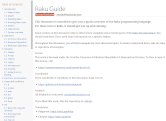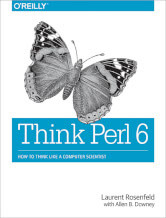Last Updated on May 22, 2022
Raku is a member of the Perl family of programming languages. Formerly known as Perl 6, it was renamed in October 2019. Raku introduces elements of many modern and historical languages. Compatibility with Perl was not a goal, though a compatibility mode is part of the specification.
Raku offers many features such as:
- Object-oriented programming including generics, roles and multiple dispatch;
- Functional programming primitives, lazy and eager list evaluation, junctions, autothreading and
- hyperoperators (vector operators);
- Parallelism, concurrency, and asynchrony including multi-core support;
- Definable grammars for pattern matching and generalized string processing;
- Optional and gradual typing.
Raku is multi-paradigmatic. It supports Procedural, Object Oriented, and Functional programming.
Read more about Perl in our compilation of the best free books for Perl.
1. Raku Guide by Naoum Hankache

This document is intended to give you a quick overview of the Raku programming language. For those new to Raku, it should get you up and running.
This guide covers operators, variables, functions and mutators. Later chapters cover loops and conditions, I/O, subroutines, functional programming, classes & objects, and exception handling. The guide finishes with chapters on regular expressions, Raku modules, Unicode, parallelism, concurrency and asynchrony, and native calling interface.
This work is licensed under the Creative Commons Attribution-ShareAlike 4.0 International License.
2. Raku One-Liners by Andrew Shitov
 RakuOne-Liners: Getting the most of Raku’s expressive syntax for your daily routines introduces the reader to many short programs, so short that they can be written in a single line of code.
RakuOne-Liners: Getting the most of Raku’s expressive syntax for your daily routines introduces the reader to many short programs, so short that they can be written in a single line of code.
The seven chapters will guide you through Raku’s syntax elements that help to create short, expressive, but still useful programs.
It is assumed that the reader knows the basics of the Raku programming language and understands programming in general.
3. Think Raku: How to Think Like a Computer Scientist by Laurent Rosenfeld, with Allen B. Downey
 Think Raku is an introduction to computer science and programming intended for people with little or no experience.
Think Raku is an introduction to computer science and programming intended for people with little or no experience.
This aim of this book is not primarily to teach Raku, but instead to teach the art of programming, using the Raku language. After having completed this book, you should hopefully be able to write programs to solve relatively difficult problems in Raku, but the author’s main aim is to teach computer science, software programming, and problem solving rather than solely to teach the Raku language itself.
Think Raku is a free book available under a Creative Commons license.
Next page: Page 2 – Perl 6 at a Glance and more
Pages in this article:
Page 1 – Raku Guide and more
Page 2 – Perl 6 at a Glance and more
All books in this series:
| Free Programming Books | |
|---|---|
| Ada | ALGOL-like programming language, extended from Pascal and other languages |
| Agda | Dependently typed functional language based on intuitionistic Type Theory |
| Arduino | Inexpensive, flexible, open source microcontroller platform |
| Assembly | As close to writing machine code without writing in pure hexadecimal |
| Awk | Versatile language designed for pattern scanning and processing language |
| Bash | Shell and command language; popular both as a shell and a scripting language |
| BASIC | Beginner’s All-purpose Symbolic Instruction Code |
| C | General-purpose, procedural, portable, high-level language |
| C++ | General-purpose, portable, free-form, multi-paradigm language |
| C# | Combines the power and flexibility of C++ with the simplicity of Visual Basic |
| Clojure | Dialect of the Lisp programming language |
| ClojureScript | Compiler for Clojure that targets JavaScript |
| COBOL | Common Business-Oriented Language |
| CoffeeScript | Transcompiles into JavaScript inspired by Ruby, Python and Haskell |
| Coq | Dependently typed language similar to Agda, Idris, F* and others |
| Crystal | General-purpose, concurrent, multi-paradigm, object-oriented language |
| CSS | CSS (Cascading Style Sheets) specifies a web page’s appearance |
| D | General-purpose systems programming language with a C-like syntax |
| Dart | Client-optimized language for fast apps on multiple platforms |
| Dylan | Multi-paradigm language supporting functional and object-oriented coding |
| ECMAScript | Best known as the language embedded in web browsers |
| Eiffel | Object-oriented language designed by Bertrand Meyer |
| Elixir | Relatively new functional language running on the Erlang virtual machine |
| Erlang | General-purpose, concurrent, declarative, functional language |
| F# | Uses functional, imperative, and object-oriented programming methods |
| Factor | Dynamic stack-based programming language |
| Forth | Imperative stack-based programming language |
| Fortran | The first high-level language, using the first compiler |
| Go | Compiled, statically typed programming language |
| Groovy | Powerful, optionally typed and dynamic language |
| Haskell | Standardized, general-purpose, polymorphically, statically typed language |
| HTML | HyperText Markup Language |
| Icon | Wide variety of features for processing and presenting symbolic data |
| J | Array programming language based primarily on APL |
| Java | General-purpose, concurrent, class-based, object-oriented, high-level language |
| JavaScript | Interpreted, prototype-based, scripting language |
| Julia | High-level, high-performance language for technical computing |
| Kotlin | More modern version of Java |
| LabVIEW | Designed to enable domain experts to build power systems quickly |
| LaTeX | Professional document preparation system and document markup language |
| Lisp | Unique features - excellent to study programming constructs |
| Logo | Dialect of Lisp that features interactivity, modularity, extensibility |
| Lua | Designed as an embeddable scripting language |
| Markdown | Plain text formatting syntax designed to be easy-to-read and easy-to-write |
| Objective-C | Object-oriented language that adds Smalltalk-style messaging to C |
| OCaml | The main implementation of the Caml language |
| Pascal | Imperative and procedural language designed in the late 1960s |
| Perl | High-level, general-purpose, interpreted, scripting, dynamic language |
| PHP | PHP has been at the helm of the web for many years |
| PostScript | Interpreted, stack-based and Turing complete language |
| Prolog | A general purpose, declarative, logic programming language |
| PureScript | Small strongly, statically typed language compiling to JavaScript |
| Python | General-purpose, structured, powerful language |
| QML | Hierarchical declarative language for user interface layout - JSON-like syntax |
| R | De facto standard among statisticians and data analysts |
| Racket | General-purpose, object-oriented, multi-paradigm, functional language |
| Raku | Member of the Perl family of programming languages |
| Ruby | General purpose, scripting, structured, flexible, fully object-oriented language |
| Rust | Ideal for systems, embedded, and other performance critical code |
| Scala | Modern, object-functional, multi-paradigm, Java-based language |
| Scheme | A general-purpose, functional language descended from Lisp and Algol |
| Scratch | Visual programming language designed for 8-16 year-old children |
| SQL | Access and manipulate data held in a relational database management system |
| Standard ML | General-purpose functional language characterized as "Lisp with types" |
| Swift | Powerful and intuitive general-purpose programming language |
| Tcl | Dynamic language based on concepts of Lisp, C, and Unix shells |
| TeX | Markup and programming language - create professional quality typeset text |
| TypeScript | Strict syntactical superset of JavaScript adding optional static typing |
| Vala | Object-oriented language, syntactically similar to C# |
| VHDL | Hardware description language used in electronic design automation |
| VimL | Powerful scripting language of the Vim editor |
| XML | Rules for defining semantic tags describing structure ad meaning |
